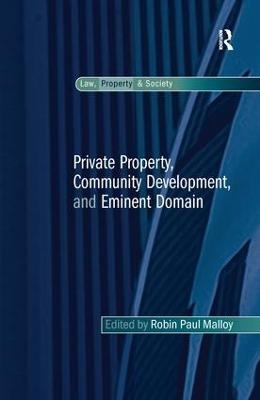
Private Property, Community Development, and Eminent Domain
Routledge (Verlag)
978-1-138-27553-9 (ISBN)
The contributors in this volume address the fundamental relationship between the state and its citizens, and among the people themselves. Discussion centers on a recent decision by the United States Supreme Court in the case of Kelo v. City of New London. This case involved the use of eminent domain power to acquire private property for purposes of transferring it by the State to another private party that would make "better" economic use of the land. This type of state action has been identified as an "economic development taking". In the Kelo case, the Court held that the action was legal within provisions of the US Constitution but the opinion was contentious among some of the Justices and has been met with significant negative outcry from the public. The Kelo case and the public debate arising in its aftermath give cause to assess the legal landscape related to the ability of government to fairly balance the tension between private property and the public interest. The tension and the need to successfully strike a balance are not unique to any one country or any one political system. From the United States to the United Kingdom, to the People's Republic of China, property and its legal regulation are of prime importance to matters of economic development and civic institution building. The Kelo decision, therefore, explores a rich set of legal principles with broad applicability.
Robin Paul Malloy is E.I. White Chair and Distinguished Professor of Law at Syracuse University College of Law, USA. He is Vice Dean, and Director of the Center on Property, Citizenship, and Social Entrepreneurism. He is also Professor of Economics (by courtesy appointment) in Maxwell School of Citizenship and Public Affairs, College of Law, Syracuse University. Professor Malloy writes extensively on law and market theory and on real estate transactions and development. He has published 10 books, more than 25 articles, and contributed to 10 other books.
Chapter 1 Private Property, Community Development, and Eminent Domain, Robin PaulMalloy, James CharlesSmith; Chapter 2 Hysteria versus History, Michael AllanWolf; Chapter 3 Kelo, the Castle, and Natural Property Rights, Eric R.Claeys; Chapter 4 Nothing “Errant” About It, D. BenjaminBarros; Chapter 5 Controls over the Use and Abuse of Eminent Domain in England, TomAllen; Chapter 6 Federalism and Localism in Kelo and San Remo, Marc R.Poirier; Chapter 7 Just Compensation in an Ownership Society, Rachel D.Godsil, DavidSimunovich; Chapter 8 Kelo v. City of New London and the Prospects for Development after a Natural Disaster, Carol NecoleBrown;
| Erscheinungsdatum | 14.05.2017 |
|---|---|
| Reihe/Serie | Law, Property and Society |
| Verlagsort | London |
| Sprache | englisch |
| Maße | 156 x 234 mm |
| Gewicht | 453 g |
| Themenwelt | Naturwissenschaften ► Geowissenschaften ► Geografie / Kartografie |
| Recht / Steuern ► Allgemeines / Lexika | |
| Recht / Steuern ► Arbeits- / Sozialrecht ► Sozialrecht | |
| Recht / Steuern ► EU / Internationales Recht | |
| Recht / Steuern ► Öffentliches Recht ► Völkerrecht | |
| Recht / Steuern ► Wirtschaftsrecht ► Gesellschaftsrecht | |
| Sozialwissenschaften ► Soziologie ► Spezielle Soziologien | |
| ISBN-10 | 1-138-27553-0 / 1138275530 |
| ISBN-13 | 978-1-138-27553-9 / 9781138275539 |
| Zustand | Neuware |
| Informationen gemäß Produktsicherheitsverordnung (GPSR) | |
| Haben Sie eine Frage zum Produkt? |
aus dem Bereich


